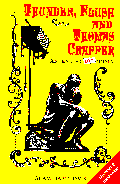Thunder, Flush and Thomas Crapper: E
^UP^ to Thunder, Flush and Thomas Crapper index.
Chapters: A B C D E F G H I J K L M N O P R S T U V W Y Z

Extracts from Adam Hart-Davis's book.
(Buy the book from Micheal O'Mara Books, ISBN 1-85479-250-4, hardback 1-85479-245-8, or in the US, ISBN 1570760810.)
- Earth Closets
-
 An earth-closet is a lavatory in which dry earth is used to cover excreta.
Until Victorian times, the traditional 'place of easement' for people
living in the country was either a privy with a cesspit, or an
earth-closet. Queen Victoria used an earth-closet at Windsor Castle,
although many types of water-closet were available. For many years, the
earth- and water- closets were rival systems with champions and detractors
on both sides.
An earth-closet is a lavatory in which dry earth is used to cover excreta.
Until Victorian times, the traditional 'place of easement' for people
living in the country was either a privy with a cesspit, or an
earth-closet. Queen Victoria used an earth-closet at Windsor Castle,
although many types of water-closet were available. For many years, the
earth- and water- closets were rival systems with champions and detractors
on both sides.
To make a simple earth-closet, you dug a hole in the ground, leaving the earth piled beside the hole. You could simply squat over the hole, but it was common to build a seat above it. After each visit you shovelled in a little earth on top of the excrement. This process continued until the hole was full, when you covered it over, and dug a new hole a short distance away.
- School Loo
-
W Liddiard patented a commode "particularly adapted for use indoors,"
and a multi-seater earth-closet for use in schools [see illustration in
book, p57]. Any number of units could be bolted together, side by
side, and the earth-releasing mechanism operated from a distance, so
that children could be prevented from playing with the device and
wasting the earth.
- Ash Loo
-
An 1873 dry-ash commode could be filled straight from the fire-grate.
The cinders were automatically separated and kept for re-burning, while
the fine ash covered the contents of the bucket every time the lid was
raised. A later version had a removable drawer instead of a bucket,
rather like some chemical lavatories today.
- Euphemisms
-
A euphemism is a less distasteful word or phrase used as a substitute for
something more offensive. Somehow the object and place in which people
excrete has always been thought of as offensive, and we have no simple
direct words for them. Both lavatory and toilet originally meant somewhere
to wash; a water-closet is a cupboard or small room with a water supply.
Using such euphemisms seems to be general human behaviour; similar expressions crop up in many cultures and languages; see astronauts, Australia, Bible, France, Germany, New Zealand, trains, United States.
- Euphemisms for lavatory
-
Here are some of the words and phrases used in Britain to mean what I
call a lavatory: bog, cloakroom, close stool, closet, commode,
convenience, garderobe, gents, heads, jakes, khazi, ladies, latrine,
lavatory, loo, necessary, netty, place of easement, powder room, privy,
shit-house, smallest room, thunder-box, toilet, water-closet, and WC.
Hamilton Ellis suggests that railway companies were responsible for the use of the word toilet. Eighty years ago some railway carriages had a room in which to wash, labelled 'Toilet', opposite one with a water-closet, labelled 'WC'. When the two rooms were combined, the 'Toilet' label was used.
In the sanitaryware business a 'lavatory' means a wash-basin; a recepticle for excretion is called a 'closet'.
For the verb 'go to the lavatory' we use these euphemisms: explore the geography of the house, go to the bathroom/
cloakroom/ loo/ toilet, pay a visit, powder my nose, visit the smallest room, or wash my hands. At school we used to put up a hand and say 'Please may I be excused?' So 'to be excused' also meant to go to the lavatory. - Euphemisms for faeces (and defecate)
- Big jobs, crap (crap, have a crap, take a crap), dump (do a dump), heap (do a heap), number two, plock (do a plock), plop-plop or plop, poo or pooh, shit, or stool (go to stool).
- Euphemisms for urinate
- Jimmy Riddle, micturate, pee, piddle, piss, pump ship, slash, strain the potatoes, water the garden/
tulips/ tomatoes, wee, or widdle, and, for men, point Percy at the porcelain, or shake hands with an old friend. When asked to give a word of advice to newly-commissioned officers, the Duke of Wellington is supposed to have said 'Never neglect an opportunity to pump ship!'.
Text extracts from "Thunder, Flush and Thomas Crapper" copyright (c) Adam Hart-Davis 1997. Web extracts first published 2007-07-18, updated ✎2023-09-01
Images available from the DHD Multimedia Gallery.
Site content copyright (c) Damon Hart-Davis 1997--2018 unless otherwise stated.
Hosted by ExNet.
